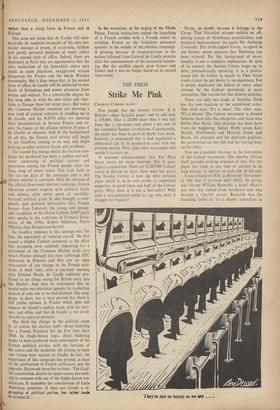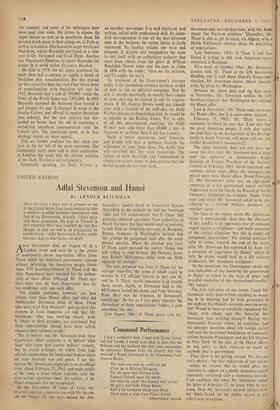THE PRESS
Strike Me Pink
CHARLES CURRAN writes : Few people buy the Sunday Citizen. It is Britain's oldest Socialist paper, and its sale now is 259,000. That is 23,000 more than it was last June. But it represents only about 1 per cent of the combined Sunday circulations. Consequently, the paper has been in peril of death. Last week, however, it announced that it had negotiated a substantial cut in its production costs with the printing unions. That, plus other economies, will enable it to carry on.
A welcome announcement, this. For Fleet Street wants no more funerals. Yet it spot- lights a conundrum. There are 12,205,000 Labour voters in Britain (at least, there were last year). The Sunday Citizen is now the only national paper which is, in its own words, 'a committed supporter, in good times and bad' of the Labour party. Why, then, is it not a best-seller? With such a vast potential public to tap, why must it struggle for readers?
Partly, no doubt, because it belongs to the Co-op. That Victorian' octopus exhales an off- putting aroma of 'dowdiness, parochialism, and technical backwardness' (to quote Mr. Anthony Crosland). The cloth-capped Co-op, wrapped in red flannel, seems unaware that Mafeking has been relieved. Yet this background of mori- bundity is not a complete explanation. In spite of its owners, the Sunday. Citizen keeps up to date; journalistically speaking, it is a profes- sional job. Its failure to match its Fleet Street rivals cannot be put down to incompetence. For it simply duplicates- the failure of every other attempt by the , Labour movement at mass journalism. The reasons for that deserve scrutiny.
There are only two kinds of Socialist. Each has his own reaction to the established order. One kind says, 'It's a mess.' The other says, `It's a shame.' The Labour movement is divided between those who like blueprints and those who dislike blue blood. This cleavage has been there from the beginning; Sidney Webb versus Keir Hardie, MacDonald and Maxton, Attlee and Bevan, the planners and the platform pugilists, the governesses on one side and the roaring boys on the other.
You see a parallel cleavage in the journalism of the Labour movement. The Sunday Citizen itself provides striking evidence of that. For the paper has tried, at one time or another in its long history, to operate on each side of the gap.
It was created in 1850, as Reynolds' Newspaper (a title that it retained until 1962). Its parent was George William Reynolds, a naval officer's son who was sacked from Sandhurst and who became a Chartist orator. Reynolds was the founding father of 'it's a shame' journalism in
`They're just as happy as we are . .
this country; and some of his techniques have been used ever since. He strove to expose the upper classes as well as to overthrow them. He devoted much space to their goings-on, in Paris as well as in London. One favourite target was Louis Napoleon, whom Reynolds portrayed as a mix- ture of Dr. Verwoerd and Errol Flynn. Another was Napoleon's Empress, to whom Reynolds did justice in a serial called Eugenie's Boudoir.
He died in 1879; but his paper continued for more than half a century to supply a blend of Socialism plus sensationalism. But this proved far less attractive than the rival Fleet Street brew of sensationalism with Socialism left out. In 1955, Reynolds had a sale of 579,000—while the News of the World figure was 7,971,000. In 1962 Reynolds slammed the bedroom door behind it and jumped the gap. It changed its name to the Sunday Citizen, and offered its readers Socialism plus sobriety. But the new mixture has suc- ceeded no better than the old in capturing a circulation anywhere commensurate with the Labour vote. The conclusion seems to be that ideology makes no mass appeal.
You see further evidence for that when you look at the far left of the press spectrum. The Communist party were told at their conference in London this week that the present position of the Daily Worker is not satisfactory.
Technically speaking, the Daily Worker is an excellent newspaper. It is well displayed, well written, edited with professional skill. Its indus- trial correspondent is one of the best-informed men in the business. Its racing tipster is justly renowned. Its leading articles are terse and pungent. It distorts and manipulates the news to suit itself with an unblushing audacity that must draw cheers from the ghost of William Randolph Hearst (who sent his men to Cuba in 1898 with the order: 'Give me the pictures, and I'll supply the war').
Its treatment of the Government's incomes policy is (in journalistic terms) a textbook model of bow to run an editorial campaign. Day by day, it swoops unerringly on exactly those pieces of news that can be cooked to suit its require ments. If Mr. George Brown ,could put himself over with a fraction of the skill that the Daily Worker devotes to demolishing him, he would be as popular as the Rolling Stones. Yet, in spite of all this unscrupulous expertise, the Daily Worker now sells more than 60,000 a day—a thousand or so fewer than it did last January..
Build a better mousetrap, said Emerson, and people will beat a pathway through the wilderness to your front door. No doubt they will--provided that they want mousetraps. The failure of both Socialism and Communism as circulation-raisers seems to demonstrate that the British people do not want them.







































 Previous page
Previous page